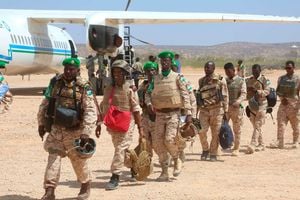9th House opens Thursday with election of Speaker

Aswa county MP Okumu Reagan swearing-in yesterday. PHOTO BY GEOFFREY SSERUYANGE
The outgoing Speaker of Parliament, Mr Edward Ssekandi, on Wednesday dissolved the 8th Parliament in accordance with the Constitution.
The proclamation was made at the closing of a three-day swearing-in ceremony that confirmed at least 374 members as MPs—leaving out only Gomba’s Rose Najjemba Muyinda (NRM) who was reported out of the country.
As the 8th Parliament ebbs, the second multi-party Parliament opens on Thursday with the election of the Speaker and deputy to embark on a five-year journey with a crowded agenda.
With over 20 key Bills pending, major investigations before the 8th Parliament either dumped or left half-way done, impending presidential constitutional amendments—seeking to deny bail for rioters, murderers, defilers, rapists and economic saboteurs, the 9th Parliament has got its agenda cut out.
President Museveni recently told reporters that after Parliament has elected the Speaker and deputy, he would ask the new MPs to revise the Constitution, a move that has been criticised by the opposition as uncalled for.
However, with the majority in the 9th Parliament, it’s unlikely that the minority opposition will succeed in blocking the proposed amendments.
In leading his or her party to triumph, between Rebecca Kadaga (NRM) and Nandala Mafabi (FDC), whoever will be elected Speaker today, faces the beginning of the next and harder fight ahead. With a ratio of 7:1, balancing the views of the minority opposition and the ruling NRM party majority will be a test for the next Speaker, in his or her attempt to deal with the backlog and making the new Parliament relevant.
In the battle for the Deputy Speaker, Jacob Oulanyah (NRM, Omoro) faces Odonga Otto (FDC, Aruu) and independent member, Mr Fox Odoi (West Budama North Country).
For instance, in the face of increased corruption in the country, Parliament has never handled any Inspector General of Government report conclusively not even the Parliament’s Public Accounts Committee reports on the findings of the Auditor General. Consequently, billions of shillings meant for service delivery abused by government officials remain uncounted for.
Opposition complaints
The annual Uganda Human Rights Commission reports to Parliament have continued to gather dust in the Legal and Parliamentary Affairs Committee yet some oral questions from members asked five years ago have never been answered—highlighting a clogged agenda for the next Parliament.
For silencing the opposition views, some opposition MPs have accused outgoing Speaker Ssekandi of bias, a claim he denies.
But with the majority in the 9th Parliament, the NRM will continue to influence decision-making in the House through its dominant caucus often chaired by President Museveni. The NRM Caucus politics in a multi-party political setting has led to the rise of “rebel” MPs in Parliament.
For disobeying the party decisions on some issues in the caucus, some of the outspoken NRM MPs in the 8th Parliament led by Lwemiyaga MP Theodore Ssekikubo, Henry Banyenzaki (Rubanda West) and Chris Baryomunsi (Kinkizi East), among others, have since been disparaged as rebels.
However, having served as Speaker for 13 years, five of which under a multi-party system, Mr Ssekandi advised MPs in the 9th Parliament to learn the operations of a multi-party system to avoid clashes.
“The problem I have seen is the suspicion of people that a member of a different party doesn’t like another of a different party. That is wrong. I have treated everybody equally and my conscience is clear.”
First-term MPs will, however, face challenges in dealing with the unfinished 2011/12 budget scrutiny and other key Bills in the House. Some of the Bills expected to be returned to the House include; The Retirement Benefits Sector Liberalisation, Bill 2011, Anti-Gay Bill, Marriage and Divorce Bill, HIV/Aids Prevention and Control Bill, Regional Governments Bill, among others.
With the dissolution of the 8th Parliament, the new Parliament will have to draft its own rules of procedure to guide its operations. The House Committee on Rules and Discipline is expected to handle this process. Top on the agenda will be whether the Parliament’s Public Accounts Committee should be allowed to investigate ministries or and other government agencies who misuse public funds.
In the proposed rules of procedure before the 9th Parliament this mandate as spelt out under Rule 148 had been controversially removed, raising fears of increased corruption in government departments.
However, most of the opposition MPs who took oath promised to increase the fight against corruption in the NRM government while other new MPs promised to serve the country first, before their party. “The challenge we have in the 9th Parliament is to deal with the widespread corruption,” Mr Richard Ssebuliba (DP, Kawempe South) said.
He added: “Our friends in the NRM and their Speaker have let us down on many occasions, from Temangalo to Chogm scandals, we had the opportunity to make a statement. Unfortunately they used their number to forgive criminals in government who took public funds”.




